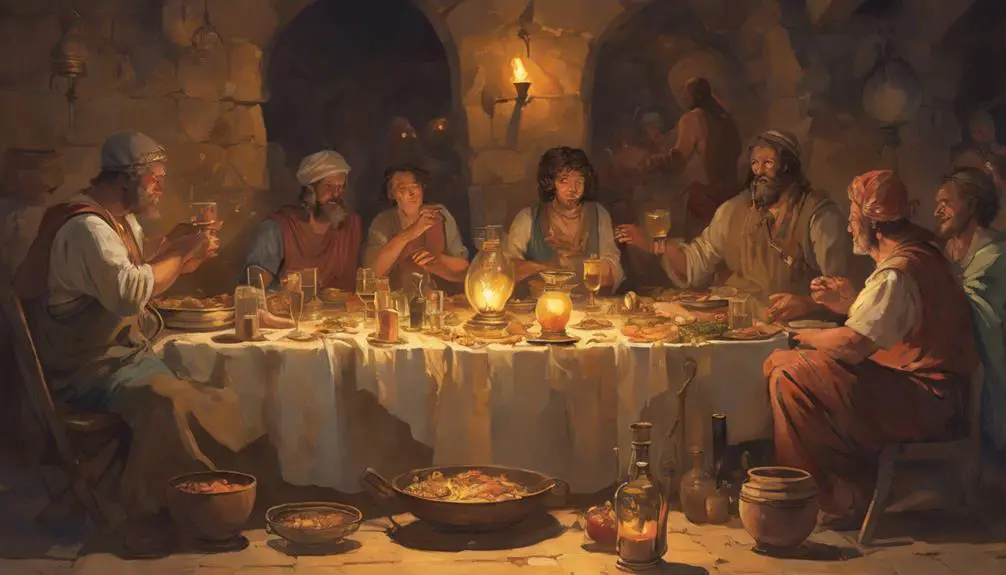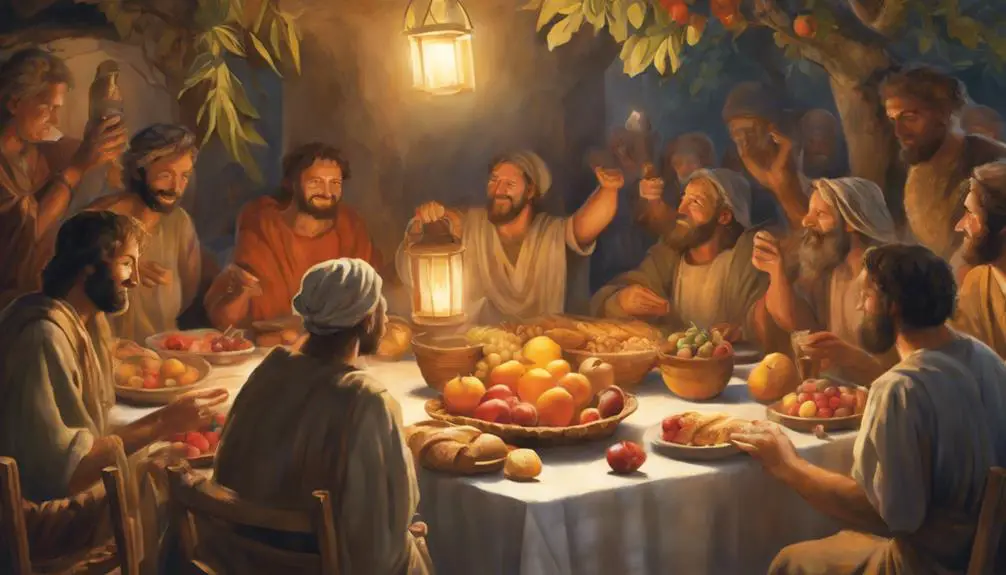Navigate the biblical significance of carousing to uncover its deep moral implications and why it still matters today.

What Does Carousing Mean in the Bible
In the Bible, carousing denotes not just indulgence but a divergence from spiritual discipline; it's both a marker of excess and a warning against moral decay. You'll discover that this term, steeped in historical context, carries implications far beyond its surface meaning.
As we unpack the concept, you'll see how carousing is portrayed, its consequences, and why it remains a relevant caution for believers today. The journey through scriptural narratives and teachings will leave you pondering how contemporary practices align or clash with these ancient warnings, inviting a deeper exploration into your own life and beliefs.
Key Takeaways
- Carousing in the Bible signifies excessive revelry often linked with moral condemnation.
- Biblical texts use carousing to highlight the importance of moderation and self-control.
- Scripture warns of the spiritual and social consequences of indulging in carousing.
- Reflecting on carousing encourages believers to lead balanced lives aligned with spiritual values.
Defining Biblical Carousing

In the context of biblical scripture, 'carousing' refers to engaging in excessive revelry, often marked by the consumption of alcohol, which is condemned as immoral behavior. This term's origins trace back to ancient texts, where celebrations and feasts frequently crossed the line into indulgent, disorderly conduct. The biblical stance on carousing, therefore, isn't merely about condemning the act of celebration but rather the excess and loss of self-control associated with it.
Translation variations play a significant role in understanding the concept of carousing within the Bible. Different versions of the Bible may use terms like 'reveling,' 'debauchery,' or 'orgies' to convey the sense of carousing, each bringing its nuance to the interpretation. These variations stem from attempts to capture the essence of the original texts, written in languages like Hebrew and Greek, where a single word might encompass a broader range of behaviors than its English counterpart.
Analyzing the term 'carousing' in the Bible requires careful consideration of these translation variations, as they reveal the multifaceted nature of what's deemed immoral. It's a call to moderation, highlighting the fine line between celebration and excess.
Historical Context and Examples
Delving into historical contexts and examples, we find that biblical narratives frequently depict carousing as a reflection of societal norms and moral boundaries of the times. This activity, often occurring within social gatherings, reveals much about the cultural interpretations of behavior and ethics in ancient communities.
- Feasts of Kings: Ancient texts describe lavish feasts held by kings, where carousing was a common feature. These events weren't merely for pleasure but also served as displays of power and wealth.
- Religious Festivals: Certain biblical festivals involved communal meals and celebrations. Here, carousing symbolized joy and gratitude, although excess was frowned upon.
- Wedding Celebrations: Marriages in biblical times were significant social events, often accompanied by prolonged festivities, including music, dancing, and yes, carousing. These instances highlighted communal unity and joy.
- Public Gatherings: Instances of carousing in public gatherings, outside of specific celebrations, provided insights into everyday social interactions and the limits of acceptable behavior within those societies.
Analyzing these examples underscores the nuanced understanding of carousing within biblical texts. It wasn't merely about indulgence but also about community, identity, and the boundaries of social conduct.
Moral Implications

Carousing in biblical narratives often serves as a lens through which the moral fabric of ancient societies is examined and understood. This practice, frequently depicted in scripture, isn't just a recount of historical events but a delve into the ethical considerations that underscore the behaviors and decisions of individuals and communities. You'll notice that the Bible doesn't merely recount tales of revelry and excess but positions these narratives within a framework of moral inquiry, prompting readers to reflect on the implications of such actions.
The societal impact of carousing, as depicted in the Bible, isn't trivial. This activity isn't just about individual lapses in judgment but reflects broader societal values and norms. Through biblical accounts, you're invited to consider how collective indulgence in excessive behaviors can erode the moral and ethical foundations of a community. The narratives challenge you to think beyond the immediate gratification of such acts and ponder their effects on societal cohesion and moral integrity.
In essence, the biblical treatment of carousing isn't just an ancient critique but a timeless reflection on the consequences of forsaking ethical considerations for momentary pleasures. It prompts a deeper contemplation of how individual actions resonate within the larger societal context, impacting the collective moral compass.
Warnings and Consequences
Reflecting on the moral implications of carousing, it's crucial to explore the warnings and consequences highlighted throughout biblical texts. The Bible, across various passages, presents a consistent message regarding the spiritual and social fallout of indulging in unrestrained pleasure. To understand these admonitions deeply, let's examine them under four main points:
- Immediate Spiritual Alienation:
Scripture frequently associates carousing with a severance from spiritual integrity and closeness with the divine. This alienation isn't just a metaphorical distance but a palpable rift in one's relationship with their faith and community.
- Long-term Social Repercussions:
Beyond the spiritual, the Bible illustrates how excessive revelry can lead to lasting damage within one's social circles, including family and community relationships. These narratives underscore the importance of moderation to maintain social harmony.
- Cultural Interpretations:
Throughout history, various cultures have interpreted biblical warnings about carousing differently, reflecting broader societal values and norms. These interpretations offer insights into how communities prioritize spiritual health and social cohesion.
- Modern Parallels:
Today, we find parallels between biblical admonitions and modern discussions about the consequences of excess in all forms. This continuity highlights the timeless relevance of these warnings, urging a reflective and measured approach to pleasure.
Analyzing these aspects reveals the depth of biblical caution against carousing, emphasizing a balanced life that honors both spiritual and social commitments.
Lessons for Contemporary Believers

For contemporary believers, understanding the biblical warnings about carousing offers crucial insights into leading a balanced life that aligns with spiritual values. The concept of carousing, often associated with excessive partying or revelry, carries significant implications for modern applications, especially in how one's actions can influence both personal faith and societal impact. The Bible's cautionary stance serves as a reminder that indulgence in such behaviors can lead not only to personal detriment but also to a negative influence within one's community.
Analyzing these biblical texts, it becomes apparent that the lessons extend beyond mere prohibition. They encourage a reflective approach to lifestyle choices, emphasizing the importance of moderation and the cultivation of virtues that contribute positively to society. This perspective is particularly relevant in today's context, where social norms and pressures can sometimes blur the lines between acceptable enjoyment and detrimental excess.
As you navigate contemporary challenges, these teachings can serve as a moral compass, guiding you away from the pitfalls of carousing towards a more fulfilling and responsible existence. Embracing these lessons fosters a deeper understanding of your spiritual journey and its broader societal impact, underscoring the timeless relevance of biblical wisdom in modern life.
Frequently Asked Questions
How Does the Concept of Carousing in the Bible Compare to Similar Behaviors Addressed in Other Religious Texts?
When comparing the concept of carousing in religious texts, you'll find cultural interpretations and comparative ethics play key roles.
Other texts often mirror the Bible's caution against excess and moral decay, yet each brings its unique cultural lens.
This comparison reveals a common ethical thread – a warning against indulgence.
Can Carousing Be Seen in a Positive Light in Any Biblical Narratives, or Is It Uniformly Condemned?
In your exploration of biblical narratives, you'll find that carousing, often seen through a lens of festive justification, isn't uniformly condemned.
Consider the Wedding at Cana, where Jesus turns water into wine, supporting a celebration. This story showcases cultural adaptation, suggesting that in contexts of joy and community, what might typically be seen as carousing can be viewed positively.
It's a nuanced stance, reflecting broader cultural and situational considerations within the text.
Are There Any Notable Figures in Modern History or Contemporary Culture Who Have Been Compared to Biblical Examples of Carousers?
You're looking for celebrity comparisons and historical parallels to biblical carousers. Many public figures have been likened to these notorious partiers, drawing from their widely publicized exploits.
From rock stars to politicians, these individuals often embody the excess and indulgence associated with biblical narratives. Such comparisons aren't just tabloid fodder; they offer a lens through which we can explore contemporary values against the backdrop of ancient wisdom and cautionary tales.
How Do Different Christian Denominations Interpret the Biblical References to Carousing, and Does It Influence Their Congregation's Guidance or Doctrine?
In exploring how Christian denominations interpret biblical references to carousing, you'll find denominational debates at the core. These discussions significantly influence the guidance or doctrine imparted to congregations, shaping their moral and ethical views.
The congregational impacts vary, with some denominations adopting stricter interpretations that discourage any form of excessive revelry, while others may offer a more lenient understanding. This variation affects how members approach and understand biblical teachings on carousing.
In What Ways Have Artists, Musicians, or Writers Used the Theme of Biblical Carousing to Inform Their Works or Convey Messages About Morality and Behavior?
You've likely noticed how artists, musicians, and writers weave musical metaphors and artistic allegories around themes of revelry and moral conduct. These creative minds draw from a rich tapestry of historical and cultural narratives, using the concept of celebration to explore deeper questions of morality and behavior.
Their work often serves as a mirror, reflecting societal attitudes towards excess and virtue, inviting you to ponder the complexities of human nature and ethical living.
Conclusion
In sum, biblical carousing, deeply embedded in historical and moral contexts, serves as a stark warning against indulgence in reckless festivities. The scriptures paint a vivid picture, cautioning that it's not all fun and games when it comes to spiritual consequences and societal impacts.
For contemporary believers, these lessons are as relevant as ever, urging a path of moderation and reflection. Heeding these warnings can steer one clear of the slippery slope that leads away from spiritual integrity.



Sign up